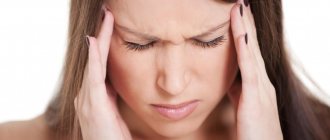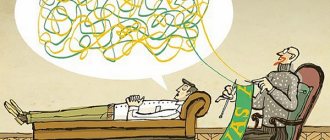Severe depression is characterized by low self-esteem, feelings of guilt and even suicidal thoughts. The physical condition is disturbed: weight decreases (less often - increases), sleep is disturbed, and unpleasant pain occurs in different parts of the body.
In the brain, although temporary, quite pronounced changes occur in the biochemical and physiological processes of nerve cells: disturbances in the ratio of excitation and inhibition processes, changes in the exchange of neurotransmitters, etc.
Getting out of severe depression requires the help of a doctor. Depressive conditions are treated by a psychiatrist and psychotherapist. Only a doctor has the necessary knowledge in the field of psychology, physiology and biochemistry of the body, and knows the mechanisms of development of a depressive state.
Each person with depression has their own individual combinations of causes and mechanisms for the development of a depressive state. The doctor finds them out and accordingly selects treatment tools: medications, diet, rest, sleep, isolation from external stimuli, psychotherapy, physical therapy, etc.
Recent research in the field of neurophysiology has shown that severe depressive conditions are characterized by significant, but often completely reversible changes in brain function and mental state.
The most important thing to know is that depression (even severe) is a reversible condition!
Severe depression causes
Severe depression usually occurs for two reasons: psychological and physiological.
For psychological reasons, depression can develop as a result of stress or any traumatic situation. This could be the death of a loved one or relative, physical or moral violence, a terrible disaster in which a person became a participant, and many others. Usually, after two months, the depressive state can go away, but without proper help it drags on and severe depression can develop.
A number of seemingly insignificant unpleasant life situations present in a person’s life for quite a long time can become a source of constant stress. Lack of material resources; work that doesn't bring you joy; forced living with unpleasant people; deterioration in the quality of life due to any chronic disease - all this can be attributed to a constant stressful situation.
Severe depression can develop due to frustration - a condition in which a person constantly feels that his desires are impossible to fulfill.
An existential crisis can simultaneously act as both a cause and a manifestation of depression. It is expressed in the loss of life goals, a feeling of the meaninglessness of existence, and an imbalance of harmony.
The physiological causes of depression have completely different roots. Alcohol and drug use, menopause, cerebrovascular accidents, severe fatigue, chronic diseases, lack of proper nutrition - this is just a small list of physiological disorders that can lead to severe depression. An important fact is that depression rarely develops for any one reason; often several factors lead to it. And successful treatment is only possible if all the causes of this mental disorder are taken into account.
Etiology
To date, the exact causes of depression have not been clarified. But the most widespread and clinically confirmed theory is hereditary disorders of neurotransmitter production. But the impetus for the development of the disease is external reasons:
- serious illness, death of a close relative;
- chronic fatigue;
- constant conflicts in the family and/or at work;
- regular severe stress, etc.
Some experts believe that a predisposition to depression is formed in early childhood, when, due to incorrect upbringing, the child becomes dependent on the opinions of others and fears that his actions will be incorrectly assessed.
Severe depression symptoms
The fact that a person is severely depressed is determined by the following symptoms: depressed mood, decreased performance and activity, constant feeling of fatigue, inability to concentrate on anything, constant self-flagellation and guilt, low self-esteem, thoughts of suicide, a gloomy and hopeless look for your future, insomnia or, conversely, severe drowsiness, loss of appetite.
The clinical picture of severe depression is as follows: a person experiences a persistent feeling of melancholy every day; his mood is depressive; signs of psychomotor retardation are observed; he cannot concentrate his attention on anything; sexual desire decreases; in the morning the patient feels tired and exhausted due to the fact that he cannot sleep normally at night. Manifestations of severe depression also include a feeling of suffocation and discomfort in the chest, complete apathy, pessimistic views of one’s future (a person always expects an accident to happen), lack of will, inability to make any decisions, constant drowsiness and a feeling of laziness.
How to identify depression
If a person close to you is constantly gloomy and sheds tears for any reason or without it, he is overcome by thoughts about the imminent end of his life, he constantly looks at everyone as enemies, take him to the doctor or invite a specialist to your home. Treatment will be more effective if you start fighting the disease in a timely manner. This is the case when it is impossible to play it safe. It is easier to fight the disease if a person is aware of the danger and is ready to listen to the doctor’s recommendations. A severe form of the disease requires hospital treatment. If you notice frequent mood swings, lethargy, lack of appetite, or the appearance of unexplained pain in different parts of the body, do not delay, visit a doctor as soon as possible.
Severe depression signs
If a person does not have the strength and desire to do anything, if he cannot force himself to do anything, and at the same time is constantly in a bad, depressed mood, then this indicates signs of a depressive state. Manifestations of depression also include constant laziness, which disguises apathy. The fact is that during severe depression, a person’s brain begins to work differently - its biochemical processes change, which leads to laziness. There are three main brain transmitters that are responsible for a person’s mood, energy and performance - dopamine, norepinephrine and serotonin. And when their work is disrupted, complete apathy sets in and there is a lack of energy to engage in any activity. In such cases, it is necessary to start treatment with special drugs on time, otherwise the person simply will not want to get out of bed in the morning and will completely lose interest in life. The consequences of severe depression can be very serious and negative for the patient - a constant feeling of fear and anxiety develops, eventually acquiring manic forms.
The course of severe depression in pregnant women deserves special attention. Since it often causes miscarriage. Therefore, at the slightest sign of depression, a woman needs to seek help from a specialist.
Clinical manifestations
Depression causes cognitive, psychomotor, and other types of dysfunction (eg, difficulty concentrating, increased fatigue, decreased libido, loss of interest or pleasure in previously enjoyable activities, sleep disturbances), as well as low mood. People with depressive disorder often have suicidal thoughts and may attempt suicide. There is often a combination of depression with other psychiatric symptoms (such as anxiety and panic attacks), which make diagnosis and treatment difficult.
Patients with any form of depression are more likely to abuse alcohol or illicit drugs in an attempt to self-treat sleep problems or anxiety. However, depression is far from being a common cause of alcoholism and drug addiction, as many people mistakenly believe. It has been observed that such patients smoke a lot, ignoring the harmful effects of nicotine on their health, increasing the risk of developing or exacerbating somatic disorders (for example, COPD).
Depression can reduce the protective immune response. This disease increases the risk of developing cardiovascular disorders, AMI and stroke, possibly due to the fact that in depression there is an increase in the levels of cytokines and clotting factors, and the heart rate decreases; these two circumstances are potential risk factors for the development of cardiovascular disorders.
Major depression (unipolar disorder)
Patients may appear unhappy, with tear-stained eyes, frowning eyebrows, and downturned corners of the mouth; They are characterized by a tired posture, lack of eye contact, lack of facial expressions, poor gestures, changes in speech (eg, soft voice, monotone intonation, use of monosyllabic words). The appearance of the manifestations may resemble Parkinson's disease. In some patients, the depressed mood is so deep that they are unable to experience normal emotions and feel as if the world has become colorless and lifeless.
The diet of such patients may be seriously disrupted, which requires immediate intervention.
Some patients with depression neglect personal hygiene, or do not even pay attention to their children, relatives or pets.
For diagnosis
Major depression requires that ≥ 5 of the following signs be present almost every day during the same 2-week period, and one of these signs must be depressed mood or loss of interest or pleasure:
- Depressed mood most of the day
- Marked decrease in interest or enjoyment in all or almost all activities for most of the day
- Significant (> 5%) weight loss/gain or loss/increase in appetite
- Insomnia (often associated with inability to stay asleep) or hypersomnia
- Psychomotor agitation or retardation observed by others (not self-reported)
- Fatigue or loss of energy
- Feelings of worthlessness or excessive or unreasonable guilt
- Decreased ability to think or concentrate, or indecisiveness
- Recurrent thoughts of death or suicide, suicide attempts, or specific plans to commit suicide
Chronic depressive disorder
Depressive symptoms that persist for ≥ 2 years without remission are classified as chronic depressive disorder (CDD), a term that combines what was previously called chronic major depression and dysthymic disorder.
Symptoms usually begin during adolescence and may persist for years or decades. The number of symptoms often fluctuates above and below the threshold for diagnosing an episode of major depression.
Patients in this state are usually gloomy, they are characterized by a pessimistic assessment of events, lack of a sense of humor, passivity, lethargy, isolation, a tendency to complain, and excessive criticism of themselves and others. Patients with CDD are more likely to have anxiety, substance use, or personality disorders (eg, borderline personality disorder).
For diagnostics
For persistent depressive disorder, the patient must be depressed most of the day half the day for ≥ 2 years and have ≥ 2 of the following symptoms:
- Decreased or increased appetite
- Insomnia or hypersomnia
- Weakness or increased fatigue
- Low self-esteem
- Poor concentration or difficulty making decisions
- Feeling hopeless
Premenstrual dysphoric disorder
Premenstrual dysphoric disorder (PMD) is characterized by symptoms associated with anxiety and mood changes that clearly coincide with the menstrual cycle, beginning during the premenstrual phase and resolving after menstruation. Symptoms should have been present during most menstrual cycles within the past year.
Manifestations are similar to those of premenstrual syndrome, but more severe, causing clinically significant discomfort and/or obvious deterioration in social or occupational functioning. The disorder may begin any time after menarche; it may get worse as menopause approaches, but it stops after it. In a given 12-month period, it is estimated that between 2 and 6% of menstruating women suffer from PDR.
For diagnostics
For premenstrual dysphoric disorder, patients must have ≥ 5 symptoms in the week before menstruation. Symptoms should begin to subside within a few days of the start of your period and decrease to a minimum or disappear within a week of your period. ≥ 1 of the following symptoms must be present:
- Noticeable mood swings (such as sudden episodes of sadness or tearfulness)
- Severe irritability or anger, or worsening interpersonal conflicts
- Noticing depressed mood, feelings of hopelessness, or self-deprecating thoughts
- Severe anxiety, tension, or nervousness
In addition, ≥ 1 of the following symptoms must be present:
- Decreased interest in usual activities
- Difficulty concentrating
- Weakness or increased fatigue
- Noticeable change in appetite, overeating, or craving certain foods
- Hypersomnia or insomnia
- Feeling overwhelmed or out of control
- Physical symptoms such as mastodynia or breast swelling, joint or muscle pain, feeling of swelling and weight gain
Other depressive disorders
Groups of symptoms characteristic of a depressive disorder are classified as other depressive disorders (specified or unspecified) if they do not fully meet the criteria for other depressive disorders but nevertheless cause significant physical discomfort or interference with normal functioning.
This group also includes episodes of dysphoria lasting less than 2 weeks with ≥ 4 other depressive symptoms in people who have never been diagnosed with another mood disorder (eg, recurrent short-term depression), and longer-lasting depressive episodes during which there were insufficient symptoms to diagnose another depressive disorder.
Additional signs
Major depression and chronic depressive disorder may have one or more features that characterize additional manifestations during a depressive episode:
- Anxiety
: Patients feel tense and unusually restless; they have difficulty concentrating because they worry or fear that something terrible might happen, or they feel like they might lose control. - Mixed features
: Patients also have ≥ 3 manic or hypomanic symptoms (eg, elevated mood, delusions of grandeur, increased talkativeness, racing ideas, decreased sleep duration). Patients with this type of depression are at risk of developing bipolar affective disorder. - Melancholic:
Patients lose pleasure in almost all activities or do not respond to previously pleasant stimuli. They may be depressed and hopeless, feel excessive or unreasonable guilt, experience early morning awakenings, significant psychomotor restlessness or retardation, severe anorexia, or weight loss. - Atypical:
Temporary improvement in patients' mood in response to positive events (for example, being visited by children). Patients also have ≥ 2 of the following: overreaction to criticism or rejection of any kind, lead paralysis (a feeling of heaviness, usually in the limbs), weight gain or increased appetite, and hypersomnia. - Psychotic:
Patients experience delusions and/or hallucinations. Delusions often include ideas about committing unforgivable acts or crimes, about incurable or shameful diseases, and patients may also imagine themselves as a victim of persecution. Hallucinations can be auditory (for example, patients hear voices accusing or condemning them) or visual. If only voices are described, then special attention should be paid to whether these voices are true hallucinations. - Catatonic
: Some patients experience severe psychomotor retardation and may engage in excessive zeal in useless activities and/or abandon them; Some patients grimace and repeat speech they hear (echolalia) or movements they see (echopraxia). - Prenatal or postpartum onset
: The disorder begins during pregnancy or within 4 weeks after delivery. Psychotic features may be present; Infanticide is often associated with psychotic episodes, when the patient hallucinates orders to kill the child or she deliriously believes that the baby is possessed by the devil. - Seasonality
: Episodes occur at certain times of the year, most often in the fall or winter.
Severe depression and suicide
Severe depression is dangerous because the patient completely loses the instinct of self-preservation. A persistent feeling of melancholy, as well as constant pain tormenting his soul, makes him think about suicide. An overwhelming feeling of guilt, a feeling that he deserves punishment, a desire to free his loved ones, often push a person to commit suicide. According to statistics, 15% of people with mental disorders of unknown etymology become victims of suicide.
At the onset of the disease, the person is so weak, exhausted by severe depression, that he is unable to take any steps to take his own life. But as soon as this condition goes away, the patient may attempt to commit suicide. He will think through the suicide plan in detail, develop it, and try to create a deceptive impression that he has gotten better, without leaving the thought of committing suicide.
The most common cases of suicide are among lonely people with a history of somatic illnesses and people with a history of suicide in their family.
What should a person do if he has all the signs of severe depression? There is only one answer to this question: seek help immediately. If depression is not treated, it will become chronic, and this is fraught with very dangerous consequences.
Method of treating depression
If the disease is neglected, it can linger for years. Without treatment, symptoms may not go away, so the right solution is fast and effective medical help. The main methods of combating depression include psychotherapy and medication.
Drug treatment involves taking antidepressants. In our psychiatric hospital, when prescribing medications, we are guided by individual selection. This may be one or a combination of antidepressants to achieve a positive effect. The clinic’s specialists insist that the key to successful treatment lies in an integrated approach. the cognitive behavioral approach is often used in therapy , which has shown high effectiveness.
This technique involves teaching a person the ability to manage his mood. A patient who is shrouded in depression interprets everything that happens around him from a negative point of view. This grows like a snowball: a bad mood provokes gloomy judgments regarding all areas of life. Cognitive-behavioral psychotherapy does not allow a snowball to grow: the doctor teaches the patient to differentiate thoughts and manage mood. Automatic thoughts (negative interpretations of the patient) are blocked over time, the person is quite able to resist the negativity, and as a result, the patient’s gradual recovery from depression is noted.
Full treatment of depression in a clinic in Moscow takes place according to all the rules and takes into account the wishes of the patient or the patient’s relatives.
The Korsakov Psychiatric Center offers the following types of psychotherapy:
— Psychoanalysis.
Together with the doctor, the patient finds the cause of the condition. This technique also implies a deep analysis of childhood traumas that took place in life.
— Interpersonal therapy.
This treatment option involves studying the patient’s relationships with people around him, who in one way or another influence the depressive state. The therapy process is structured in such a way that the patient learns to extract positivity from communications.
— Family psychotherapy.
An integrated approach allows you to effectively treat both the patient himself and his relatives, who deal with the patient’s depressive mood every day. It often happens that relatives only worsen a person’s condition, although they strive to help him. Therefore, the help of a specialist is simply necessary. The doctor will delicately suggest a strategy of action, thereby improving the family microclimate.
— Group therapy.
This technique is based on the use of art therapy and music therapy, which are popular and quite effective today. A psychotherapist provides therapy in a group using art. This therapy allows patients with depression to quickly find contact, not be afraid to express their fears and teach them to overcome them.
In order for the treatment of depression in a clinic in Moscow to be effective, we recommend entrusting the solution of a delicate problem to medical professionals with experience in this field. In our department you can count on providing medical services in full: from diagnosis and diagnosis to complete cure. Depression is curable! An individual approach to the patient speeds up the healing process, so a private visit to a psychotherapist gives good results.
Where to look for help
Remember that even though the disease may seem unserious, only a highly qualified psychiatrist with sufficient practical experience can cure it. If you find these symptoms in yourself or your loved ones, we recommend that you contact a specialist.
It is important to convince the patient that help will be effective if the specialist’s recommendations are fully followed. CELT employs doctors who will help you quickly cope with any manifestation of depression. Treatment will always give a positive result if you start working with the patient in a timely manner.
Depersonalization-derealization syndrome is a fairly serious mental disorder that can easily be corrected. If you find these symptoms in yourself or your loved ones, we recommend that you consult a specialist. To clarify the diagnosis and receive qualified medical care, you can contact CELT. This is one of those conditions in the treatment of which our psychoneurologists achieve good results.
Make an appointment through the application or by calling +7 +7 We work every day:
- Monday—Friday: 8.00—20.00
- Saturday: 8.00–18.00
- Sunday is a day off
The nearest metro and MCC stations to the clinic:
- Highway of Enthusiasts or Perovo
- Partisan
- Enthusiast Highway
Driving directions










